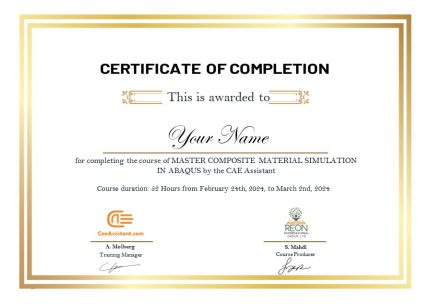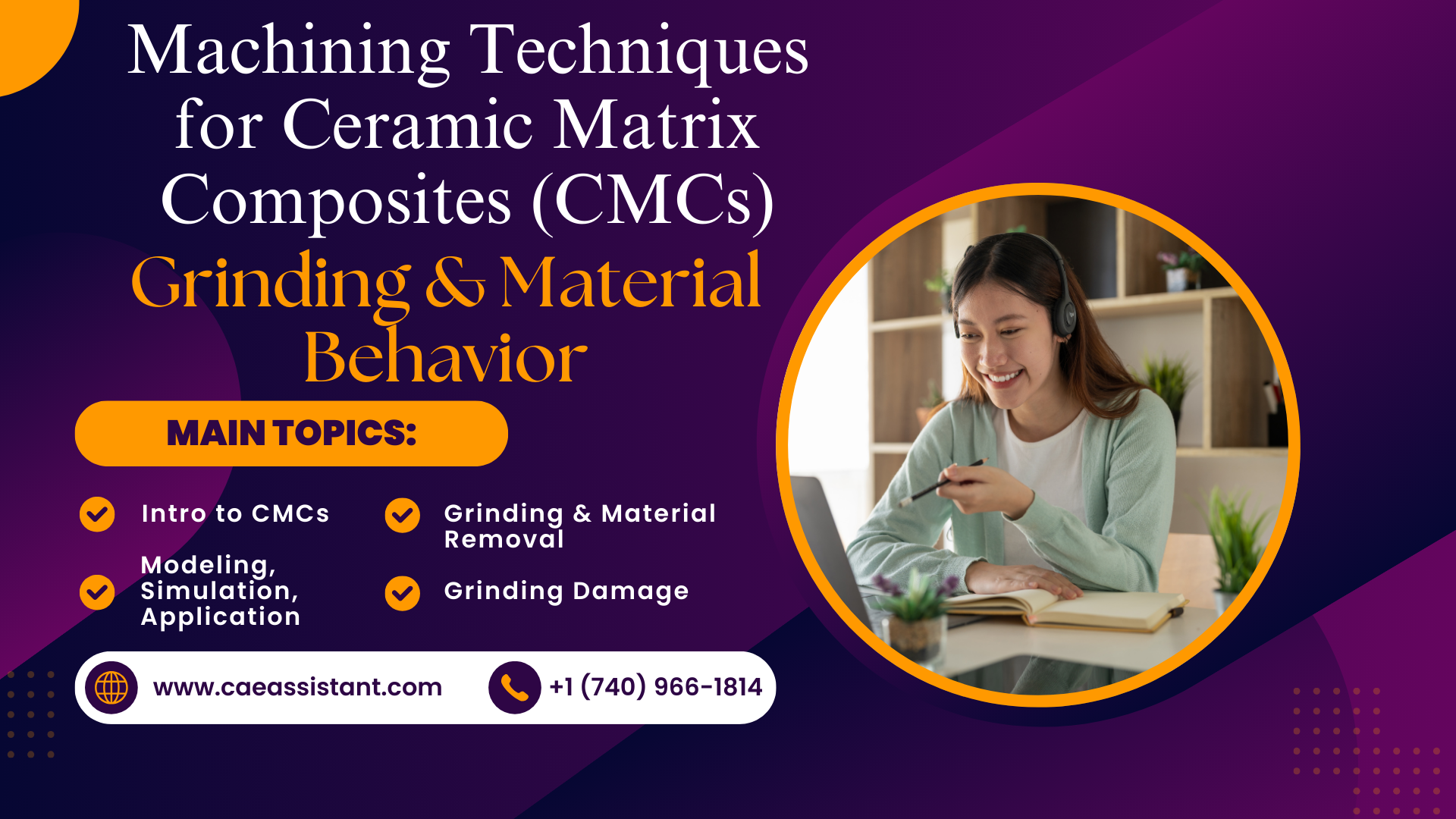This course provides an in-depth exploration of the advanced machining techniques used for processing ceramic matrix composites (CMCs), with a particular focus on grinding processes. Students will gain a thorough understanding of the material behavior under grinding conditions, including the micro-interactions between abrasive grains and CMCs. The course covers modeling and simulation of grinding forces, quality evaluation, and strategies for reducing grinding-induced damage. Through case studies and practical examples, participants will learn how to apply these techniques to achieve high-quality machining in industries such as aerospace, automotive, and energy.
The main topics of this course are:
1. Introduction to Ceramic Matrix Composites (CMCs)
– Overview of CMCs: Composition, Structure, and Properties.
– Applications of CMCs in Aerospace, Automotive, and Other High-Performance Industries.
– Challenges in Machining CMCs: Hardness, Brittleness, and Anisotropy.
2. Fundamentals, Modeling, and Simulation of Grinding Processes
– Principles of Grinding: Material Removal Mechanisms.
– Grinding Wheel Design and Materials.
– Micro-Interaction Between Abrasive Grains and CMC Materials.
– Strategies for Modeling Grinding Forces in CMCs.
– Experimental and Simulation Techniques for Analyzing Grinding Processes.
– Case Studies on Force Modeling and Process Optimization.
3. Material Removal Mechanisms in CMC Grinding
– Thermal and Mechanical Load Impact on CMCs During Grinding.
– Crack Initiation and Propagation in CMCs.
– Surface/Subsurface Damage in CMC Grinding: Causes and Effects.
4. Quality Evaluation in CMC Grinding
– Surface Morphology Analysis Post-Grinding.
– Methods for Assessing Grinding-Induced Damage in CMCs.
– Techniques for Improving Surface Quality and Dimensional Accuracy.
5. Advanced Strategies for Reducing Grinding Damage
– Optimization of Grinding Parameters: Speed, Feed, and Depth of Cut.
– Use of Coolants and Lubricants to Minimize Thermal Damage.
– Innovative Grinding Techniques for Enhanced CMC Machining.
6. Case Studies, Applications, and Recent Advances in CMC Grinding
– Real-World Examples of CMC Grinding in Aerospace Engine Components.
– Application of Advanced Grinding Techniques in the Transportation and Energy Sectors.
– Lessons Learned from Industrial Practices and Research Developments.
– Emerging Technologies in Machining CMCs: Laser-Assisted and Ultrasonic Grinding.
– Future Challenges and Opportunities in High-Performance Manufacturing of CMCs.
– Prospects for Industry Adoption and Technological Innovation.
– Overview of CMCs: Composition, Structure, and Properties.
– Applications of CMCs in Aerospace, Automotive, and Other High-Performance Industries.
– Challenges in Machining CMCs: Hardness, Brittleness, and Anisotropy.
– Principles of Grinding: Material Removal Mechanisms.
– Grinding Wheel Design and Materials.
– Micro-Interaction Between Abrasive Grains and CMC Materials.
– Thermal and Mechanical Load Impact on CMCs During Grinding.
– Crack Initiation and Propagation in CMCs.
– Surface/Subsurface Damage in CMC Grinding: Causes and Effects.
– Strategies for Modeling Grinding Forces in CMCs.
– Experimental and Simulation Techniques for Analyzing Grinding Processes.
– Case Studies on Force Modeling and Process Optimization.
– Surface Morphology Analysis Post-Grinding.
– Methods for Assessing Grinding-Induced Damage in CMCs.
– Techniques for Improving Surface Quality and Dimensional Accuracy.
– Optimization of Grinding Parameters: Speed, Feed, and Depth of Cut.
– Use of Coolants and Lubricants to Minimize Thermal Damage.
– Innovative Grinding Techniques for Enhanced CMC Machining.
– Emerging Technologies in Machining CMCs: Laser-Assisted and Ultrasonic Grinding.
– Future Challenges and Opportunities in High-Performance Manufacturing of CMCs.
– Prospects for Industry Adoption and Technological Innovation.
– Real-World Examples of CMC Grinding in Aerospace Engine Components.
– Application of Advanced Grinding Techniques in the Transportation and Energy Sectors.
– Lessons Learned from Industrial Practices and Research Developments.
Our team of CAE Assistant instructors, renowned experts in their respective domains, will deliver each section of the course, providing you with unparalleled knowledge and insights.
Currently, the course instructor is being finalized, but we are committed to bringing you one of the leading experts in the field. We’re working diligently to ensure that a top researcher will be selected to develop and deliver this course soon.
Our courses are designed for a diverse audience that includes graduate and PhD students, R&D professionals in industry, and university faculty members. Each course is meticulously crafted based on the latest ISI papers and cutting-edge research to ensure that participants receive the most current and relevant knowledge in emerging technology topics.
Graduate and PhD Students: These courses provide advanced insights and practical applications of recent research, equipping students with the latest knowledge and methodologies to enhance their academic work and research capabilities.
R&D Employees: For professionals working in industrial research and development, our courses offer valuable updates on new trends and technologies, fostering innovation and enhancing their ability to address complex challenges in their projects.
University Faculty Members: Academics seeking to stay abreast of the latest developments will benefit from our courses by gaining access to cutting-edge research and emerging technologies, which can be integrated into their teaching and research activities.
By participating in our courses, all these groups will gain a competitive edge through up-to-date knowledge, practical skills, and insights directly derived from the forefront of scientific and technological advancements.
Finite Element Analysis course Certificate
Upon successful completion of this course, you will receive a course completion certificate. This certificate guarantees your skills with the amount of time spent, skills trained, and can be verified online.

Taking the “Advanced Machining Techniques for Ceramic Matrix Composites” course opens up several specialized job opportunities, including:
- Manufacturing Engineer: Specialize in machining processes for CMCs, optimizing grinding techniques to enhance production efficiency and product quality in high-performance industries like aerospace and automotive.
- Materials Engineer: Focus on the behavior and properties of CMCs under machining conditions, working to improve material performance and develop innovative processing methods.
- R&D Engineer: Engage in research to advance grinding technologies and develop new methods for reducing machining-induced damage in CMCs, contributing to cutting-edge manufacturing processes.
- Process Simulation Engineer: Utilize modeling and simulation tools to predict grinding forces and optimize machining parameters for CMCs, ensuring precision and reliability in production.
- Quality Control Engineer: Ensure the quality of machined CMC components by evaluating surface integrity and minimizing defects, crucial for applications in critical industries like aerospace.
First Session for Free!
